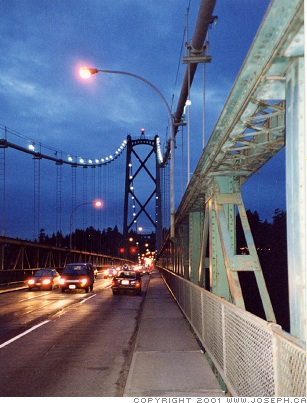|
Perhaps in your city there is a structure so potent and glorious that its existence in your mind becomes the actual architecture of your mind - a structure through which all of your dreams and ideas and hopes are funneled.
In my city, Vancouver, there is one such structure, a fairy-tale bridge called Lions Gate Bridge. Its three delicate spans link the city of Vancouver with the suburbs of the North Shore, where I grew up, and with the mountains and wilderness of British Columbia beyond those suburbs.
The only other road access to the North Shore is five miles down the harbor to the utilitarian and unfortunately rather charmless Second Narrows Bridge: a six-lane people-mover about which little more can be said without taxing the limits of charity.
Lions Gate Bridge is by no means a practical bridge -- it looks to be spun from liqid sugar, and, unfortunately, it now seems to be disolving like sugar. By urban planning and engineering standards it borders on being a disaster, but then isn't it true of life in general that nothing is more seductive than the dying starlet? The lost cowboy? The self-destructive Jazz musician?
The bridge has three harrowingly narrow lanes. Depending on the time of day, commuters on the Lions Gate may have either one or two of these lanes apportioned to them. The rule of thumb is, tormentingly, the more traffic moving in your direction, the higher the probability of having only one lane.
But enough about the bridge's technicalities. We tolerate goodness knows how much from the people we love; the same goes for objects we love, too. I figure I have driven across the bridge maybe five or six thousand times in my life -- that's all the way from Vancouver to Halifax and back -- and never in all these miles have I once tired of the view, endlessly renewing, endlessly glorious. Maybe I am headed to my parents' house or maybe I am off to the airport -- the bridge's very existence is a metaphor for journey.
Recently there has been talk of tearing down Lions Gate Bridge, and such talk truly horrifies me. People speak of Lions Gate Bridge as being merely a tool, a piece of infrastructure that can be casually deleted, plundered from our memories with not a second thought to the consequences its vanishing might have on our interior lives.
I think that when people begin to talk like this, they are running scared -- they are doing something that I know I do myself: I try to disguise what I am really feeling by saying and doing the opposite thing.
I can't do this with Lions Gate Bridge anymore. Why was it so hard until recently for me to simply say that the bridge is a thing of delicate beauty -- an intricate part of my life and memories? Why is it so hard for all of us to say loudly and clearly to each other that the bridge is an embodiment of grace and charm and we must not let it die?
Why would we destroy something we love rather than let a stupid pride prevent us from saying, "It means something to me"?
I want you to imagine you are driving north, across the Lions Gate Bridge, and the sky is steely gray and the sugar-dusted mountains loom blackly in the distance. Imagine what lies behind those mountains-realize that there are only more mountains-mountains until the North Pole, mountains until the end of the world, mountains taller than a thousand me's, mountains taller than a thousand you's.
Here is what Lions Gate Bridge is: one last grand gesture of beauty, of charm, and of grace, where civilisation ends... and eternity begins.


| 




